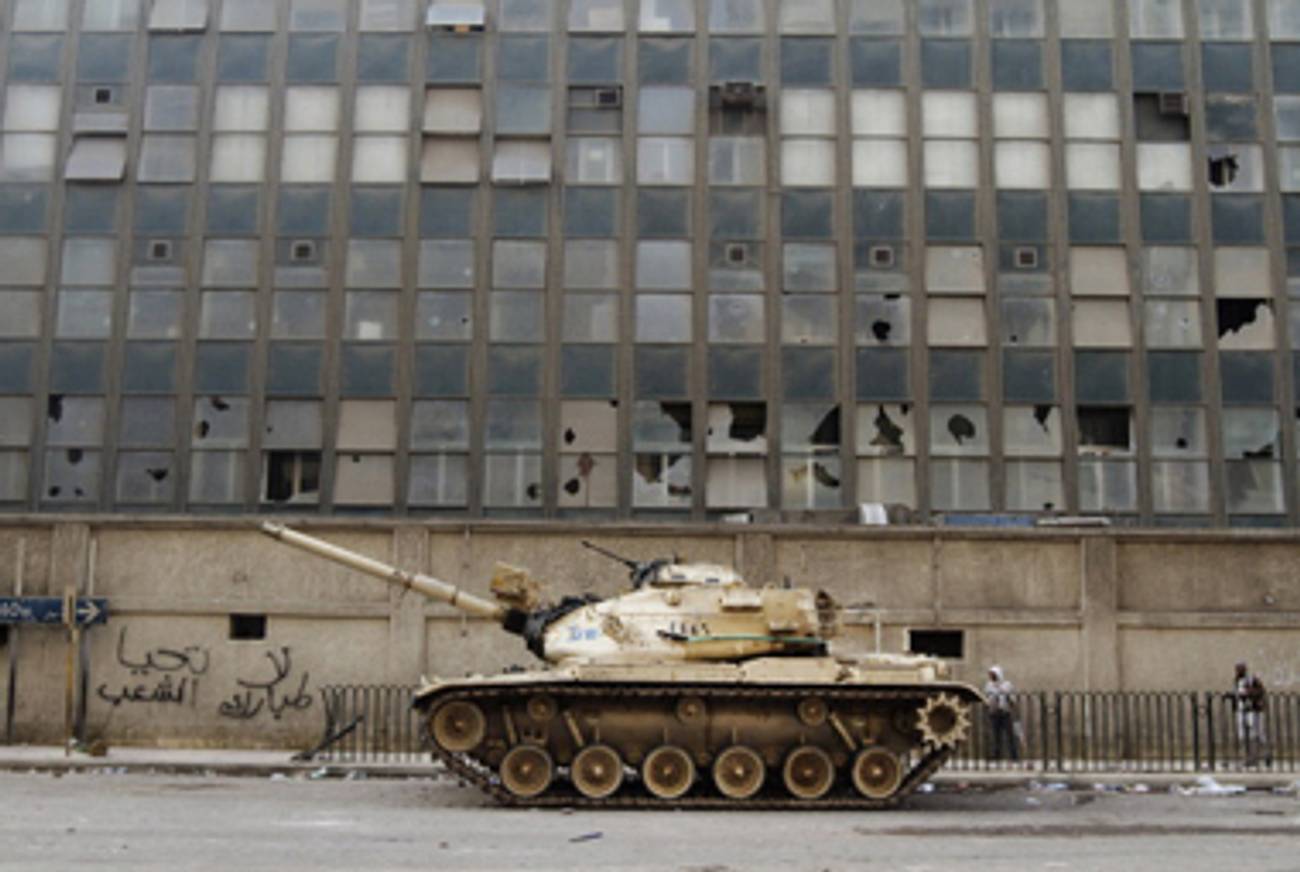Desert Storm
Israeli leaders have long had only one concern when it comes to Egypt: stability, which Hosni Mubarak provided. That’s changing, no matter who ends up in charge.




Just four weeks ago, I met in Tel Aviv with one of the chiefs of the Israeli intelligence community. In his tour d’horizon briefing, I asked him about the rumored ill health of Egyptian President Hosni Mubarak, its ramifications for the regime, and the broad prospects for the country. He did not utter a single word about Egypt’s colossal problems: spiking birth rate, rising inflation, lack of proper housing, rampant illiteracy, and enormous unemployment especially among the young. He didn’t talk about corruption, the concentration of the national wealth in the hands of a few of the president’s cronies, led by his son Gamal, or the palpable lack of hope felt by many of the 80 million Egyptians. Instead, my interlocutor said only: “At the moment there is no danger to the stability of the regime.”
One is now tempted to scoff at this statement. But it’s not that Mossad analysts, military intelligence, and most academic researchers were entirely blind about Egypt’s problems. They knew all of this very well. But they were focused on the larger picture of global and regional developments, on strategic connections, on the words and acts of the leaders and elites. They ignored the undercurrents and the details of the domestic mosaic and its effect on foreign policy. It’s a problem they’ve encountered before: Israeli intelligence is good at gathering precise information to locate and assassinate terrorists, as they did in the killing of Imad Mughniyeh, the so-called defense minister for Hezbollah, in Damascus in 2008; it is good at sabotaging Iranian nuclear facilities and executing daring operations. But, as the situation in Egypt shows, it often fails to recognize and draw conclusions from political processes.
From 1976 to 1979, Israeli intelligence as well as the CIA and Britain’s MI5 didn’t understand the power of the Iranian masses and the centrality of religion there. In 1987, these same agencies overlooked the daily frustration of the ordinary Palestinian who lived under the Israeli occupation. In 2005, they missed Hamas’ plans to take over Gaza. But this time it has far-reaching consequences for Israeli security.
***
For nearly 40 years, since the 1973 Yom Kippur War, Egypt has been Israel’s best strategic ally in the region and part of a larger axis consisting of the United States and the so-called “pro-Western moderate regimes”: Saudi Arabia, Jordan, Morocco, and the United Arab Emirates. Though Mubarak, a former commander of the air force who fought in the wars against Israel, was committed to the peace with Israel signed by his predecessor Anwar Sadat at Camp David in 1979, he didn’t allow the relationship between Egypt and Israel to prosper and be extended. Trade between the two countries was limited; cultural ties were restrained; movement and migration were circumscribed. Israel called it the “cold peace.” But Mubarak’s Egypt protected Israel’s southern flank, thus enabling Israel to cut security budgets, to enjoy economic prosperity, and to divert its attention—and occasionally its military might—to the north, where enemies such as Hezbollah, Syria, and Iran posed much graver threats. And on a personal level, Mubarak has maintained close and even sometimes intimate relations with all Israeli prime ministers since Menachem Begin—including with Yitzhak Rabin, Shimon Peres, Ehud Barak, Benjamin Netanyahu, Ariel Sharon, and Ehud Olmert. In the last two years, he had renewed these ties with Netanyahu. To the Israeli leaders, Mubarak was almost like a mature older brother: He advised them; he restrained them; he threatened them; and, above all, he tried to help broker a settlement between them and their longtime partners-in-conflict, the Palestinians.
More recently, diplomatic ties between the two countries were strengthened, and secret intelligence cooperation was flourishing under the guidance of General Omar Suleiman, the intelligence chief recently named vice president, who has frequently traveled to Israel for clandestine meetings with the Mossad, military intelligence, and Shabak (the domestic service). Though Israel and Egypt avoid exchanging military attachés and do not engage in joint military exercises, Suleiman made progress on two major developments that cemented common interests: a mutual fear of nuclear Iran, and a deep concern about the emergence of an Islamist entity led by Hamas in Gaza. The two regimes also saw eye-to-eye regarding efforts to uproot Sinai-based cells of al-Qaida, which posed a direct threat to Egypt’s main income from tourism and to Israel’s Red Sea resort in Eilat. The intelligence communities of the two nations also shared and exchanged information on Hamas terrorists and their subversive actions in the tri-border area of Israel-Gaza-Sinai. (It is no wonder that one of the first defiant actions of the Egyptian popular uprising was the escape of a dozen senior Hamas operatives from their prison cells in Sinai via tunnels into Gaza.)
But it seems perhaps that this closeness with Egypt may have come at a price for Israel: Israeli intelligence officials, having locked themselves in a position of over-reliance on Egypt, seem to have donned blinders of denial. They didn’t realize how fragile all that was, and how it revolved around one person: the aging Mubarak.
And now, as a result, Israel has been forced to make potentially dangerous concessions. Despite clear limitations outlined in the Israeli-Egyptian peace treaty, Israel—fearing that the unrest and demonstrations in Cairo will spread to its border—allowed an additional 800 Egyptian soldiers to be deployed this week in Sinai. This marks a significant Israeli compromise, given that the original agreement practically demilitarized the Sinai. Another concern is that Hamas will take advantage of the situation and renew its attacks from Gaza and Sinai against Israel. Monday already witnessed two rocket attacks against Israeli towns in the Negev desert.
The events in Egypt do not mean necessarily that its next government will walk away from the peace with Israel; a lot depends on the specific government that emerges in Cairo. But even if the next government is formed by a leader whose origins, rationality, and ideology are fashioned in Mubarak’s mold, the Israelis will be facing a much more difficult situation to manage.
Yossi Melman is a senior writer on strategic affairs, intelligence, and nuclear issues for Haaretz.
Yossi Melman is a longtime reporter on strategic affairs, intelligence, and nuclear issues. He is writing a book about the history of the Israeli intelligence community.